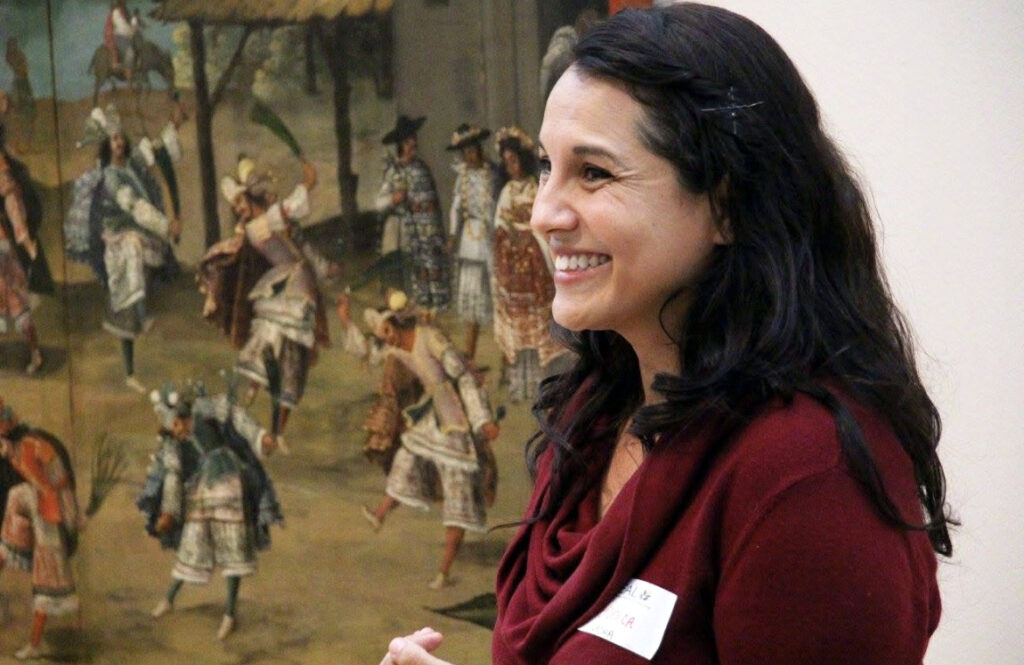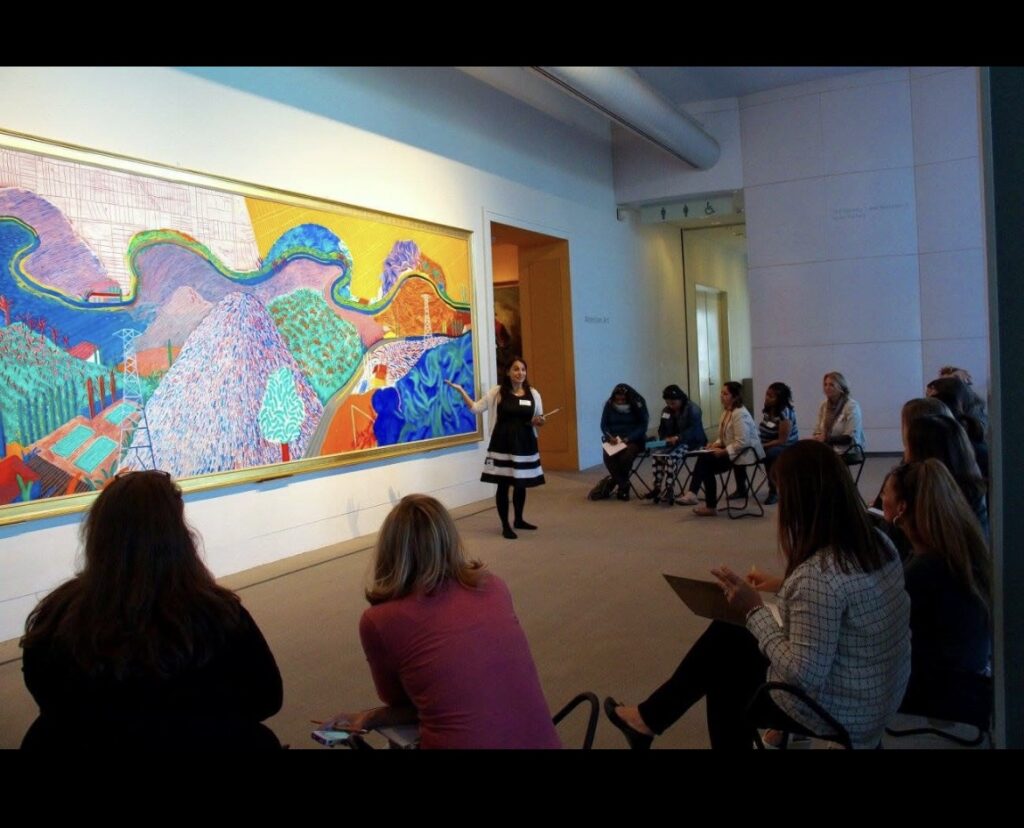
Veronica Alvarez, executive director of Los Angeles-based Create CA.
Credit: Courtesy of Veronica Alvarez
Veronica Alvarez was 4 when her family came to the U.S. from Cotija in Michoacán, Mexico, a small town famed for its cheese. Her father picked avocados amid the scorching heat in the San Fernando Valley, while her mother cleaned houses. One of nine children, she learned how to scrimp and save, how to work hard and how to dream big.
“We were so poor, I knew not to ask for much,” said Alvarez, 52, now executive director of Los Angeles-based Create CA, one of the state’s leading arts education advocacy organizations. “Looking back on those years now, I don’t know how my parents did it. I have a white-color job and two sons, and I can barely afford it.”
Her sunny disposition belies a steely resolve. She remembers well the sting of being an undocumented immigrant in the age of Gov. Pete Wilson, an era when some felt ashamed to even speak Spanish in public. She brings that fire to her arts education mission.
“I believe access to the arts is a social justice issue,” as she puts it.
“Unfortunately, students that have the most need do not get equal access and opportunities.”
Her chops as a fighter, someone who doesn’t give up on a cause, are part of what makes her special, arts advocates say.
“Veronica is an inspiring and dedicated arts education advocate and leader,” said Merryl Goldberg, a veteran music and arts professor at Cal State San Marcos, who also serves on the Create CA board. “Her commitment to equity and lifting student voices is front and center.”
Alvarez didn’t become fluent in English until about the fourth grade, but she instinctively understood that education was the key to escaping poverty.
Education was my path out of poverty. That was always my thing. I loved school.
Veronica Alvarez
The only one in her family to graduate from high school, for her, school was always a matter of sink or swim. She chose to dive deep. She paid her way through college working at Chuck E. Cheese, where she honed her chops in engaging children.
“I’ve always been pretty driven,” said Alvarez, a mother of two boys with a doctorate in education and a master’s in ancient history. “Education was my path out of poverty. That was always my thing. I loved school.”
She also loved to walk to the library. It conjured an oasis of calm amid her raucous household.
“I’d come home with bags of books and sit in a corner to read and immerse myself in the world created by the author,” she remembers. “That love of reading has lasted to this day.”
At first, she wanted to be an artist, but her fourth grade teacher said she lacked talent.
“I loved making art as a child,” said Alvarez. “But I had always been taught to respect your elders. I didn’t think it was my place to question it.”
So, she stopped trying to make art, channeling her drive into academics. Determined to graduate early, she took every AP class she could in high school and found her happy place in art history. A self-professed nerd, she always felt drawn to the world of books and ideas.
“To be able to sit and read and learn always seemed like a luxury to me,” she said.
As a child, she was first entranced by Caravaggio and Bernini, and later became beguiled by the works of Frida Kahlo and Graciela Iturbide.
 Making sure everyone can participate in the arts is what drives Veronica Alvarez, now head of Create CA.Courtesy of Veronica Alvarez
Making sure everyone can participate in the arts is what drives Veronica Alvarez, now head of Create CA.Courtesy of Veronica Alvarez
“I loved Bernini’s ‘David’ because of his teeth biting his lip; he looked vulnerable and intense — along with the fact that he was mid-motion as he threw the rock at Goliath,” she remembers. “The ‘Barberini Faun’ made me blush. A big piece of marble made me blush.”
She’s a full-fledged museum addict and a politics junkie with a passion for the place of women in antiquity, particularly Greek and Roman history. That expertise is what led her to the Getty Museum, where she helped launch the Getty Villa.
“My parents would’ve never dreamed of taking us to museums; that was not a place for us,” said Alvarez, who later became the director of school and teacher programs at the Los Angeles County Museum of Art. “My passion has always been about access and equity, making a place for everyone.”
While at the Getty, she worked on an English learners program with migrant workers who often start work at 4 a.m., which means language classes happened at all hours of the day and night. It was a struggle to convey the meanings of words until she landed on using the visual realm.
“When you learn a new language, you learn ‘manzana’ means apple, and then you see a picture of an apple,” she recalls. “I thought, why don’t we use Cézanne’s ‘Still Life with Apples’? And the conversations suddenly got so much more interesting. We got the students to really engage, centered around the artwork.”
That obsession with making sure everyone, not just the lucky few, can feel the transformative power of the arts is why she feels right at home at Create CA, which has been helping schools navigate the rules around Proposition 28, the state’s arts education mandate.
The organization has long fought for expanding access to arts education and helped advocate for arts educators and teaching artists in the classroom. One of the biggest challenges facing the organization now is making sure Prop. 28 funds are spent as they were intended, as well as pushing for more funding.
“With the passage of Prop. 28 and dedicated funds for arts education, people may think we have solved arts education,” she said. “However, while a billion dollars may sound like a lot of money, we have 6 million students in CA. When we parcel out what that means to individual school districts, especially in rural areas, sometimes the funds aren’t sufficient to hire one art teacher.”
Alvarez is known for her poise and her ability to keep the peace amid intense personalities.
“I’ve been struck by her powerfully calm demeanor and her openness to advocacy as a ground-up endeavor versus a top-down activity,” said Goldberg. “Being an arts leader can be challenging in so much as there are many voices in the mix and they don’t all agree.”
Alvarez has the polish to be diplomatic in a deeply divided world, partly because she puts the cause first.
“She brings a worldly and positive energy to the discussions, and she strikes me as very much always in the problem-solving and equity-centered mode,” said Letty Kraus, director of the California County Superintendents Statewide Arts Initiative. “I also have experienced her as hands-on, participatory, and collegial in her approach.”
For Alvarez, art is the tether that connects us to our shared human heritage. It’s a bridge to the past that all should be encouraged to cross.
“Human beings are unique,” she said. “Out of all the animals, we have the ability to create art, to connect across time and culture. That’s why I love the arts so much. The craftsmanship of the human hand, the human eye, is so important to me.”
As an educator, the elusive nature of cognition — why the human mind absorbs some concepts while discarding others — also fascinates her.
“To me, what you have to teach is the love of learning,” she said. “How does the mind retain information? It’s all about making connections. You learn something in history, and then you apply it in English. It’s about providing the full context; that’s how you retain information.”
If something truly moves us, she suggests, we may remember it forever. That’s why the arts can push us to transcend boundaries and grasp universal truths.
“The arts are essential to students’ creativity,” she said. “When students can’t access the traditional curriculum, the arts allow them to express themselves, their feelings, and tell their stories. The arts are essential to our well-being.”